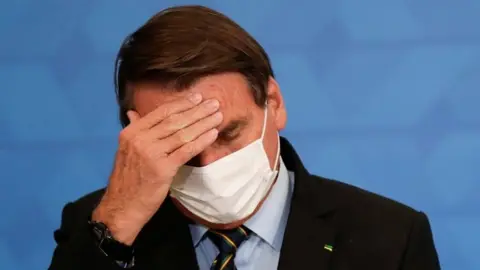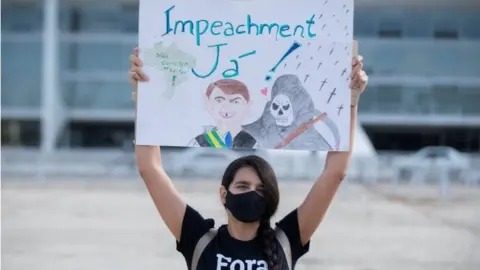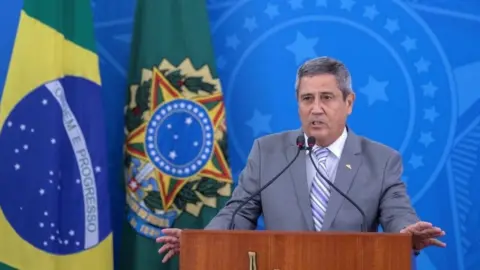Brazil: Political crisis and Covid surge rock Bolsonaro
 Reuters
ReutersBrazil's Jair Bolsonaro is facing the biggest crisis of his presidency after the heads of the army, navy and air force all quit and the country recorded its highest daily Covid-19 death toll.
The unprecedented resignation of the defence chiefs is being seen as a protest at attempts by Mr Bolsonaro to exert undue control over the military.
Mr Bolsonaro's popularity has plummeted over his response to Covid-19.
Nearly 314,000 people have died, with a new daily record of 3,780 on Tuesday.
What's the situation with Covid?
Worldwide, Brazil has the second highest number of total confirmed Covid cases with more than 12.6m. Only the United States has more.
It is also the country with the second highest number of Covid-related deaths since the pandemic began and its daily deaths currently account for about a quarter of all coronavirus fatalities in the entire world.



The high number of cases has brought the health system to the verge of collapse.
In 18 of Brazil's 26 states and in the capital, Brasilia, the occupancy of intensive care units (ICU) is above 90%, according to Brazilian public health institute Fiocruz. In two states, Amapá and Mato Grosso do Sul, ICU are completely full.
How did it get so bad?
The latest surge in cases and deaths has been attributed to the spread of a highly contagious variant of the virus which was first detected in Japan in travellers from the city of Manaus, in Brazil's Amazon state.
Preliminary data suggests the new variant could be up to twice as transmittable as the original version of the virus.
Neighbouring countries are extremely worried the new variant. Bolivia, which shares a 3,400km-long (2,100 miles) border with Brazil, announced that it would focus its Covid immunisation programme on the border areas.
Brazil's own vaccine programme has been beset by delays. So far, only 8% of its 211-million-strong population have received a first dose.
What is the political fallout?
According to a poll published by Datafolha in mid-March, 43% of Brazilians blame President Bolsonaro for the poor handling of the pandemic.
 EPA
EPAThe far-right leader has consistently opposed lockdown measures, arguing that the damage to the economy would be worse than the effects of the coronavirus itself. He has also told Brazilians to "stop whining" about the situation.
While his stance made him popular with anti-lockdown protesters, his popularity is falling. In a poll conducted in mid-March, 54% of respondents said his management of the Covid crisis was "bad" or "very bad", up from 48% in January.
Mr Bolsonaro was a divisive figure even before the pandemic hit and the rapid spread of Covid seems to have further hardened opinions.
The Datafolha poll suggests that while the percentage of those who said they "never trusted" the president's words rose from 41% to 45% between January and March, those who say they "always trust" what has only dropped slightly from 19% to 18% in that same timeframe.
However in recent days, his government has been furthered weakened by a deep political crisis.
What's happening in the cabinet?
Since the pandemic began, Brazil has had no fewer than four health ministers. The latest is Marcelo Queiroga, a cardiologist, who replaced an army officer with no medical training on 16 March.
But while changes in the health ministry have become almost par for the course, this week also saw the foreign minister and five other cabinet ministers leave.
Foreign Minister Ernesto Araújo had fallen foul of Congress, some of whose members accused him of mishandling relations with China, India and the US, which they said in turn led to Brazil not getting enough Covid vaccines from those countries.
What's with the resignations of the armed forces heads?
But it was Mr Bolsonaro's sacking of the defence minister, Fernando Azevedo e Silva, which caused the biggest storm so far.
Mr Bolsonaro and his minister had clashed over the issue of the armed forces' loyalty, which the defence minister said should be directed to upholding the constitution rather than supporting the president personally.
In a first in Brazilian history, on Tuesday the heads of the army, navy and air force all resigned together in a move signalling their opposition to the president and his sudden sacking of the defence minister's sacking.
The role of the armed forces in Brazilian politics has been a contentious issue since the country's return to democracy in 1985 after 21 years of military rule.
 EPA
EPAPresident Bolsonaro, a former army captain, caused outrage in 2019 when he organised a commemoration of the 1964 coup which brought the military to power.
He also appointed active duty and retired generals to key positions in his cabinet, including the health ministry and the vice-presidency.
But in recent weeks, top members of the military seem to have increasingly distanced themselves from the president, culminating in the resignation of the armed forces heads on Tuesday.
Mr Bolsonaro's newly appointed minister of defence, Gen Walter Braga Netto, seems to be more closely aligned with the president. In one of his first statements he said that the 1964 coup had "pacified the country" and should be celebrated.
Marking the coup's anniversary on 31 March, the general said that there had been a "very real threat to peace and democracy" and that the armed forces had confronted that threat in 1964.
